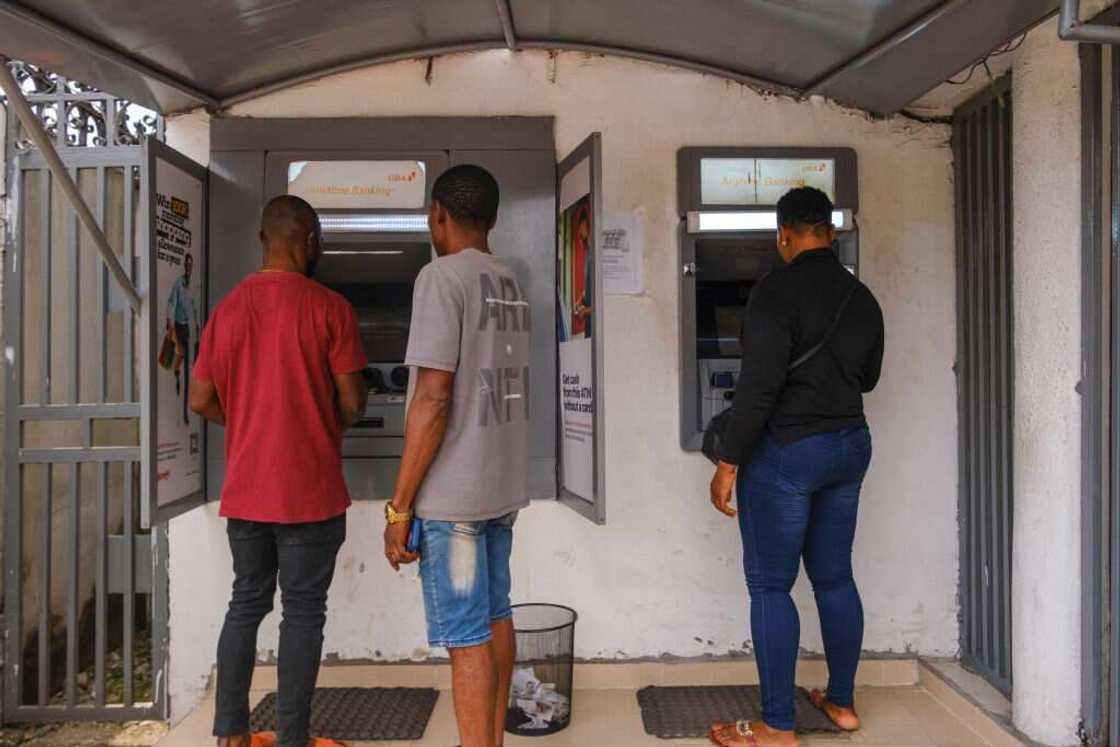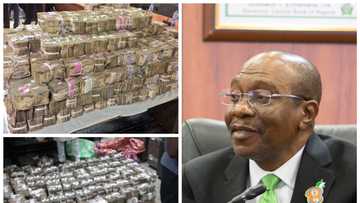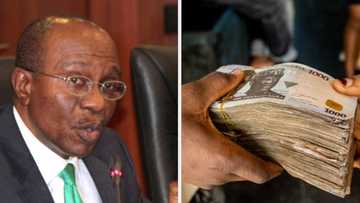List of Approved Bank Electronic Charges As CBN Limits Cash Withdrawals
- The Central Bank of Nigeria has imposed new limits on the amount of cash that Nigerians can withdraw
- The limitations apply to both over-the-counter withdrawals within banks and point-of-sale transactions
- When the policy goes into force, it is expected that more Nigerians will use electronic channels for transactions, and there is a long list of charges
On Tuesday, December 6, 2022, the Central Bank of Nigeria (CBN) announced fresh cash withdrawal limits on individuals and organisations.
The policy will become effective on January 9, 2023, Punch reports.
The memo showed individuals will be limited to N100,000 per week in withdrawals (through over-the-counter, point-of-sale, or automated teller machines), while businesses will be limited to N500,000 per week.

Source: Getty Images
It also directed banks to load only N200 and lower denominations into their ATMs. Nigerians can only withdraw N20,000 daily from ATMs when the directive becomes effective.
PAY ATTENTION: Сheck out news that is picked exactly for YOU ➡️ find the “Recommended for you” block on the home page and enjoy!
Part of the memo reads:
“The maximum cash withdrawal over the counter by individuals and corporate organisations per week shall henceforth be N100,000 and N500,000 respectively. Withdrawals above these limits shall attract processing fees of 5 per and 10 per, respectively.
“Third-party cheques above N50,000 shall not be eligible for payment over the counter, while extant limits of N10,000,000 on clearing cheques still subsist.
“The maximum cash withdrawal per week via Automated Teller Machine shall be N100,000 subject to a maximum of N20,000 cash withdrawal per day. Only denominations of N200 and below shall be loaded into the ATMs. The maximum cash withdrawal via the point of sale terminal shall be N20,000 daily.”
Bank electronic charges
The CBN believes the decision will finally help drive the cashless policy initiative, which it kicked off in January 2012 in Lagos.
While some Nigerians have praised the move, others have expressed worries, especially about multiple electronic charges.
List of the approved electronic bank charges in Nigeria
CBN, in January 2020, released guidelines for electronic charges unless it decides to make changes to reflect the new cash withdrawal policy, here are some of the bank charges.
Electronic funds transfer
The rate for electronic transfer transactions is N50 for transactions done above N50,000, N25 for N5, 000 – N50,000 and N10 charge for below N5,000.
Automatic Teller Machines (ATM)
The charge on ATM withdrawals from other banks’ ATMs was reduced to N35 from N65 for the third withdrawal within the same month.
Card maintenance fee for Naira debit/credit cards
Naira debit or credit cards linked to savings accounts attract a maximum of N50 quarterly maintenance fee, while foreign currency-denominated debit/credit cards attract $10 from $20.
The charge for the hardware token is subject to cost recovery, subject to a maximum charge of N2,500. It was reduced from N3,500.

Read also
Naira redesign: CBN records major breakthrough as Nigerians return billions to commercial banks
Naira debit /card charges
The issuance fee for these cards is N1, 000 (one-off charge) irrespective of the card type, either regular or premium card. The same charge applies for a replacement or renewal.
Intra-Scheme money transfer
Sending to an account holder attracts a minimum of N50 subject to one per cent of transaction value or N300, whichever is lower. While for a non-account holder, it attracts a minimum of N50 subject to 1.5 per cent of transaction value or N500, whichever is lower.
Others are:
Status Enquiry at the Request of Customer (e.g. Confirmation Letter, Embassy Letter, Reference Letter, Letter of Indebtedness/Non-Indebtedness etc.) attracts a rate of N500 per request.
The fee for Short Message Service (SMS) mandatory alert is N4.
Bill payment via e-channels will attract a maximum charge of N500 from 0.75 per cent of the transaction value subject to a maximum of N1, 200.
Special Request for Statement of a Bill of account is N200.
USSD transactions are also subject to N6.98 bank charge.
NCC reveals list of mobile phones Nigerians must not buy or use
In another report, Legit.ng has revealed that the Nigerian Communications Commission (NCC) released a list of unapproved phones that Nigerians are not permitted to purchase or use.
The commission also advised against using the mentioned gadgets and warned against counterfeits.
Most of the phones listed are available in the market and can be purchased for as little as N2,000.
Source: Legit.ng



